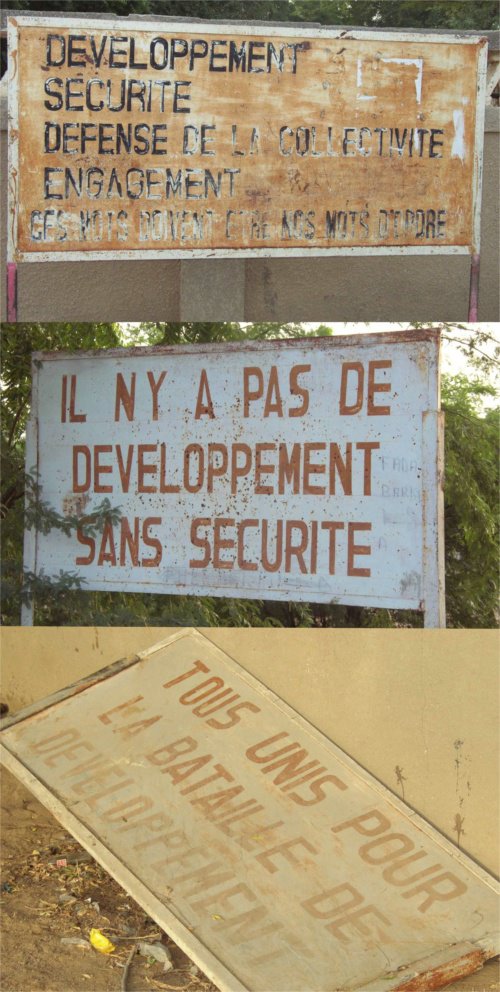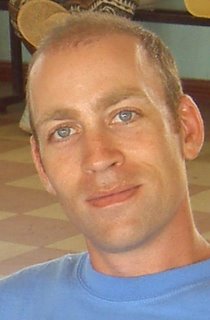
Kountché era slogans
Today I saw a goat wearing a tomato paste can as a shoe. Except for some difficulty traversing the road, he seemed untroubled by his new footwear. Niger never stops delighting my sense of humor.
The big news is that the month of Ramadan officially ended yesterday. Every year brings a huge debate over the starting and ending dates of the month, because some locales claim to see the moon earlier or later than others. Last night there was added tension in Diffa where an unusual cloudy evening obscured all celestial bodies, making the radio and television the go-to source for confirming the month’s end. I woke up this morning at my usual time, asked the guardian if today was the fête, he said yes, so I went back to sleep until 11. I think I’ve had some pent up exhaustion from the past two months and was grateful for the rest. Walking to the office, even at the noon hour, there were gangs of people in the street dressed in new outfits and making merry, clearly very happy that another year of Ramadan has ended.
The houseflies in Diffa have started taking a greater interest in my morning commutes lately. At first I wondered if I had neglected some crucial step in my morning personal hygiene routine. A mental audit, however, came back negative on that front and a quick sniff of the pits confirmed that I didn’t carry the scent of carrion on my person. I’ve concluded that the hitchhiking flies were a harbinger of the approaching cold season. This assessment seemed strengthened by the presence of dust-filled skies, another horseman of the harmmatan. Only the mornings are hazy, the sun still has enough strength to burn through the dust to make daytime temperatures sufficiently hot and miserable. Soon, the wind will suspend enough dust—and black plastic bags—to render the sky a reasonable proxy of a nuclear winter. The lower temperatures will provoke complaints from the average Abdou, and second-hand ski parkas will become this season’s “must have” fashion item. But, by the time this happens I will have left Diffa, and its houseflies, behind.
I feel a bit conflicted about leaving Diffa. I didn’t anticipate spending as much time in this corner of Niger as I have, and it’s been a mixed bag. The hardest part has been dietary. There are few restaurants here, and during Ramadan the only restaurant I had found stopped serving food halfway through the month. I’ve lived off corn flakes, sardines and fried bean cakes for the past three weeks. I only had one cartoon-like moment where a person talking to me stopped being a person and was transformed into a giant talking piece of fruit. All in all, that seems pretty good to me.
What I’ve found is that Diffa seems largely anachronistic. If Mark Twain had lived in Niger, he might have chosen Diffa as the place to live should the world have ended instead of Kentucky. I can imagine that this unchanging characteristic is a source of comfort for some and discomfort for others, particularly the youth. Aside from the presence of cell phones and a zillion motorcycles, I don’t imagine that Diffa has substantially changed in twenty years. It is the only place I’ve been in Niger that still has Kountché-era billboards on display, which are largely propagandistic and military in tone. In essence, they all portray “development” as a fight that can only be won with a secure state and a cooperative (i.e., compliant) populace. What was true then for Diffa, I think, is still true today. Being so remote, Diffa has cultivated a strong sense of independence and is viewed cautiously from Niamey as a place with the potential to incubate political unrest.
Upon entering Diffa from the west, you pass under an archway with a statue of solider on horseback atop the arch. Local lore has it that if you look at the horse as you are leaving town then you will return to Diffa another day. People at the office have been teasing me that each time I leave Diffa I look at the horse and that’s what keeps bringing me back. This time I’m not taking any chances—I’m going to be blindfolded. Maybe I’m not as conflicted as I think.

No comments:
Post a Comment